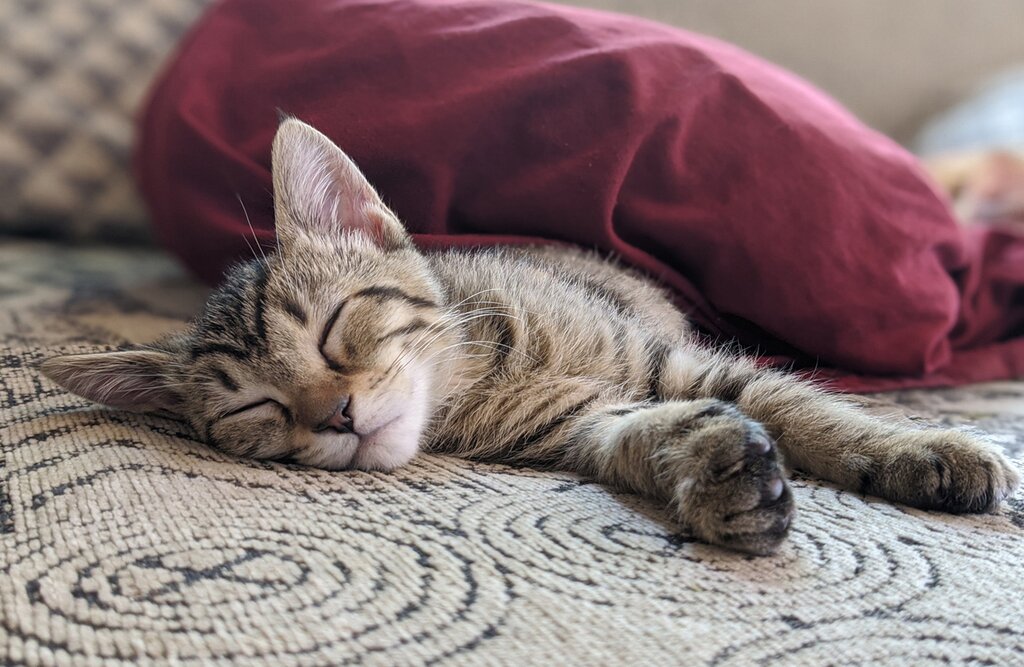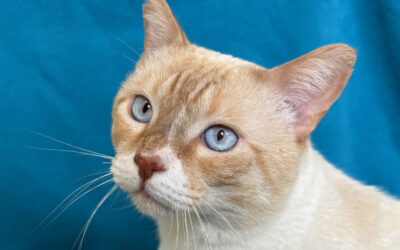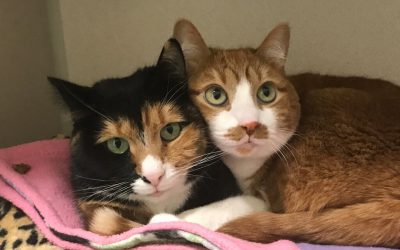 Whether your kitten comes from a shelter or a breeder or the family down the street, it’s very common for the stress of moving to trigger an Upper Respiratory Infection (URI). Just like us, their bodies can have a virus that doesn’t emerge until a stressful event occurs.
Whether your kitten comes from a shelter or a breeder or the family down the street, it’s very common for the stress of moving to trigger an Upper Respiratory Infection (URI). Just like us, their bodies can have a virus that doesn’t emerge until a stressful event occurs.
The symptoms are sneezing, runny eyes and/or nose and congestion, just like a cold in humans. In kittens and in some cats, however, it can have serious consequences.
Because the kitten or cat may no longer be able to smell its food, it may quit eating. If it does, it could literally starve to death.
You want to help your kitten or cat heal from its URI before it gets to that point. There are several things you can do, as its new parent, to prevent this.
Keep them warm
If the URI shows up in a kitten, you need to keep it warm. Young kittens are just able to start regulating their body temperatures, but an illness can really throw that off, so err on the side of caution so it doesn’t get chilled. This isn’t a bad thing for a cat, either. Besides, snuggling with your new kitten or cat will increase your bond and make you both feel better.
Make sure they’re eating
Second, make sure your kitten or cat is eating, every 4 hours if possible until you’re sure its appetite is back. A kitten of 2 to 3 months old would be starting to be weaned from its mother, but mom would make sure it was eating, especially if it was sick. Often, just your presence will help it remember that it’s time to eat. If its appetite is waning, you may need to put some food on your finger and keep offering it until the cat or kitten eats on its own again.
Don’t hesitate to bring out your cat’s favorite food at this point, since it’s much easier to prevent anorexia than heal it. Meat-only baby food is a standby for tempting kittens and cats, but avoid those brands with cornstarch in them as some cats can have allergic reactions to that. Beechnut Baby Food in chicken or turkey is a good brand. Another good choice is Hill’s brand A/D, which you must get from your vet. It has liver in it, so if you want to make something similar yourself, just blend up cooked chicken livers till pureed and feed. (This isn’t a balanced diet, so feed this only temporarily till the kitten or cat stabilizes.) If you can keep it eating, you’ll avoid having to assist feed, which is harder on both you and the kitten or cat.
Make sure they can breathe
Third, just like a human child, your cat or kitten will need help to keep breathing when everything is clogged and congested. Take your softest, smallest cloth and dampen with warm water, then gently wipe its eyes, nose and mouth. This will not only open its breathing passages, but it will make it feel like Mom is taking care of it, which will stimulate soothing endorphins. You can also use a very soft toothbrush, like the tiny Wisp by Colgate (do remove the toxic mouthwash bead and clean well first), to gently clean around the nose.
If the cat or kitten is trying to help itself by grooming, make sure to help keep their arms and paws clean too. One session trying to clean a congested face can gum up their arms so much they can no longer help themselves.
Do this as many times a day as needed, observing to make sure you don’t irritate tender areas. Research indicates that it can take 4-5 days for the kitten or cat to get its sense of smell back, so be patient. You can also use a humidifier to keep the air moist, especially in a dry climate.
Keep them playing
Last, don’t stop playing with your them, even if it is much more gently. Offer toys like cat teasers and dancers to encourage them to move around. A very sick feline may not feel like moving but a little exercise will keep the system active so it can heal itself. We’ve seen lethargic, sick kittens start to clear up in hours with a little gentle exercise.
Please see your veterinarian if your cat or kitten becomes very ill. Your vet may prescribe antibiotics in the presence of infection. Please remember, URIs are caused by viruses, so antibiotics are only supportive if they actually have a bad infection that needs attacking. As with humans, overuse of antibiotics leads to resistant viruses and a digestive tract that’s out of balance. This can suppress the body’s own ability to heal itself, leading to symptoms that don’t seem to go away. We’re not saying to always avoid antibiotics, but if you’re patient and do what you can to support your cat or kitten, it may have a better chance of healing without drugs that may make the URI worse.
Please consider making a small donation to Happy Cats Haven, where this article was written, so we can continue to help cats and kittens stay healthy.
We are a 501(c)3 organization, so your donation is fully tax-deductible. The cats and kittens (and their staff!) thank you!




